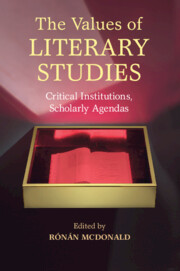Book contents
- Frontmatter
- Contents
- Notes on Contributors
- Acknowledgments
- Introduction
- 1 The Value of Criticism and the Project of Modernism
- 2 Caprice: Individual Subjectivity in Literary Criticism
- 3 The Phenomenology of Literary Valuation
- 4 Literature Is History: Aesthetic Time and the Ethics of Literary Will
- 5 Dead on Arrival: Time and the Value of Old Books
- 6 The Price of Value
- 7 To Shelter the Nothing That Happens
- 8 When Literary Criticism Mattered
- 9 Literature among the Objects of Modernist Criticism: Value, Medium, Genre
- 10 “Vale!” : Psychoanalysis, Value, and Literature
- 11 Afterlives of Comparison: Literature, Equivalence, Value
- 12 Feminism, Gender, and the Literary Commons
- 13 The Value of World Making in Global Literary Studies
- 14 Multiple Versions and Fictional Minds: Manuscript Research, Digital Editing, and Enactive Cognition in Literary Studies
- 15 After Suspicion: Surface, Method, Value
- 16 Literary Experience and the Value of Criticism
- Index
15 - After Suspicion: Surface, Method, Value
Published online by Cambridge University Press: 05 November 2015
- Frontmatter
- Contents
- Notes on Contributors
- Acknowledgments
- Introduction
- 1 The Value of Criticism and the Project of Modernism
- 2 Caprice: Individual Subjectivity in Literary Criticism
- 3 The Phenomenology of Literary Valuation
- 4 Literature Is History: Aesthetic Time and the Ethics of Literary Will
- 5 Dead on Arrival: Time and the Value of Old Books
- 6 The Price of Value
- 7 To Shelter the Nothing That Happens
- 8 When Literary Criticism Mattered
- 9 Literature among the Objects of Modernist Criticism: Value, Medium, Genre
- 10 “Vale!” : Psychoanalysis, Value, and Literature
- 11 Afterlives of Comparison: Literature, Equivalence, Value
- 12 Feminism, Gender, and the Literary Commons
- 13 The Value of World Making in Global Literary Studies
- 14 Multiple Versions and Fictional Minds: Manuscript Research, Digital Editing, and Enactive Cognition in Literary Studies
- 15 After Suspicion: Surface, Method, Value
- 16 Literary Experience and the Value of Criticism
- Index
Summary
Literary theory arose partly to combat the dogmatic certainties of Anglo-American empiricism. Yet, semiotics, linguistics, the Althusserian science of the text, and, more recently, cognitive poetics and neurocriticism suggest a hankering for a scientific methodology. As the knowledge economy boomed, science and technology accrued ever more institutional prestige and social influence. It might seem that the humanities has an ambivalent, if not neurotic relationship to science, ranging from outright hostility to grudging envy to imitative desire. If knowledge is a carnal object of yearning, then the humanities and the sciences sometimes behave like rivalrous lovers. The case of literary and art studies manifests a particularly intense instance of this anxious competitiveness in that the discursive construction of literature, in a tradition that runs from Coleridge to Arnold to Leavis, values it precisely as an antidote to the reifications of scientific modernity. In that respect, there is an abiding tension at the heart of the discipline between the value of literature – numinous, sensual, and perhaps even transcendent – and the mechanisms of criticism – rational, judicious, and objective. There is a double meaning in “criticism” that replicates the dialectic, straddling as it does observation and evaluation, objective analysis, and impressionistic response.
This essay is concerned with some of the collisions and collusions between criticism and science in literary studies, as they relate to the production or recognition of value. The subsidence of so-called symptomatic criticism, together with various shifts in institutional and social structures, has strengthened the case for science and empirical rigor in literary studies, including the pressure for them to accord with the norms of the knowledge economy. Scientism takes the sole paradigm for knowledge and truth to be the knowledge and truth gained by the natural sciences. It treats skeptically any claims of philosophy, literature, or religion to offer an alternative route to truth. But as the great physicist Erwin Schrödinger recognized: “the mind itself remains a stranger in this picture, it has no place in it, it can nowhere be found in it.” Certainly, brain science seeks to track the material manifestations of thought and feeling, and is increasingly using reading and literary sources to do so. But that is very different from the immanent, phenomenological, subjective, experience of having a mind.
- Type
- Chapter
- Information
- The Values of Literary StudiesCritical Institutions, Scholarly Agendas, pp. 235 - 248Publisher: Cambridge University PressPrint publication year: 2015
- 4
- Cited by

